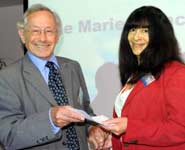Dr St Claire was presented with the award at the 18th annual conference of the British Tinnitus Association (BTA).
The award was made to Dr St Claire, as in the judgment of the BTA - her work was: “The piece of research by a UK based author most likely to result in improved treatment or public awareness of tinnitus that was published in the last calendar year.”
“Deafness Research UK welcomes the news that Dr Lindsay St Claire won the prestigious Marie & Jack Shapiro prize for her team’s research into tinnitus,” said Vivienne Michael, Chief Executive of Deafness Research UK. “This is an excellent example of groundbreaking research supported by Deafness Research UK that is having a real impact on people’s lives and we are pleased to see Dr St Claire’s work recognised in this way.”
Dr St Claire’s pioneering research has found that giving up caffeine does not relieve tinnitus (a loud ringing or buzzing in the ears) and that acute caffeine withdrawal might actually increase the symptoms.
The study was undertaken by Dr St Claire’s team at the Centre for Hearing and Balance Studies at the University of Bristol and comes at a time of increasing awareness of this debilitating condition and its impact upon thousands of sufferers throughout the UK.
It is estimated that over seven million people in the UK are affected by tinnitus and while three million people have consulted their GP with the condition, there is much anecdotal evidence to show that many choose to ignore it and don’t seek a diagnosis from their GP, yet the symptoms can be an early warning of more serious conditions. For the half a million people for whom the symptoms are severe, the condition can have a massive effect on everyday life, causing lack of sleep, problems with concentrating at work and even problems in personal relationships.
“This sort of research is always a group effort, and all the team at the Hearing Centre is delighted to have been presented with such a prestigious award, “ said Dr Lindsay St Claire. “While this research points to no casual link between caffeine and tinnitus, many other dietary restrictions are claimed to alleviate the condition, but without the benefit of such controlled studies. Further work in this area would be of great benefit to both people with tinnitus and clinicians.”
